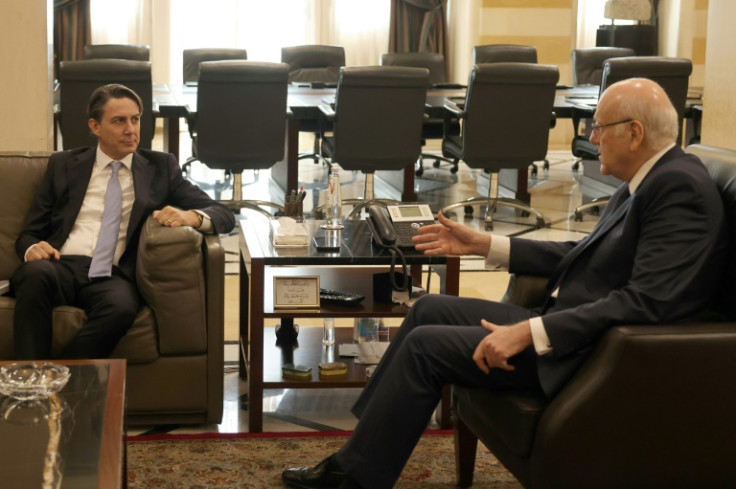
US special envoy Amos Hochstein arrived in the Lebanese capital on Tuesday for talks with officials on a truce plan, which Lebanon has largely endorsed, to halt the Israel-Hezbollah war.
The United States and France have spearheaded efforts for a ceasefire in the war, which escalated after nearly a year of deadly exchanges of fire between Hezbollah and Israeli troops.
Israel expanded the focus of its operations from Gaza to Lebanon in late September, vowing to secure its northern border to allow tens of thousands of people displaced by the cross-border fire to return home.
Since the clashes began with Hezbollah attacks on Israel, more than 3,510 people in Lebanon have been killed, according to authorities there, with most fatalities recorded since late September.
With the Lebanese government reviewing a US truce proposal, an official who has been following the talks closely said Monday that it had "a very positive view" on the plan.
"We are finalising our last remarks about the US wording of the draft," the official said.
Another government official said Lebanon was "waiting for US special envoy Amos Hochstein to arrive so we can review certain outstanding points with him".
Israeli Prime Minister Benjamin Netanyahu said Monday that Israel would continue to conduct military operations against Hezbollah even if a ceasefire is reached.
"The most important thing is not (the deal that) will be laid on paper," Netanyahu told parliament.
"We will be forced to ensure our security in the north (of Israel) and to systematically carry out operations against Hezbollah's attacks... even after a ceasefire", to keep the group from rebuilding, he said.
Netanyahu also said there was no evidence Hezbollah would respect any ceasefire.
Hezbollah began its campaign in support of its Palestinian ally Hamas, following its attack on Israel on October 7, 2023, the deadliest in Israeli history.
Hamas's attack resulted in the deaths of 1,206 people, mostly civilians, according to an AFP tally of Israeli official figures.
The health ministry in Hamas-run Gaza said the death toll in the war has reached 43,922, a majority civilians. The United Nations considers the figures reliable.
Since September, Israel has conducted extensive bombing campaigns in Lebanon primarily targeting Hezbollah strongholds, though some strikes have hit areas outside the Iran-backed group's control.
A strike on Monday on central Beirut killed five people and wounded 31 others, said the health ministry.
The area of the capital that was hit has in recent weeks become home to many who have fled Hezbollah's main bastion in the southern suburbs.
Israel has also sent ground troops into Lebanon, while Hezbollah has continued to launch projectiles into Israel almost daily.
On Monday, Israel's military said Hezbollah fired around 100 projectiles into northern Israel, with some intercepted by air defences.
In Shfaram, east of the Haifa area where Hezbollah has regularly claimed attacks, a rocket hit a building and killed a woman, emergency services said.
The building "suffered a direct hit" and 10 people were lightly wounded, paramedics said.
In the suburbs of Israel's commercial hub Tel Aviv, five people were wounded, including one woman in serious condition, after rockets were fired into central Israel, first responders said.
Hezbollah said it launched "attack drones" against "sensitive military points... in the city of Tel Aviv" and shot down an Israeli drone in south Lebanon.
The group said Tuesday it fired a salvo of rockets at the northern Israeli town of Kiryat Shmona.
G20 leaders called for "comprehensive" ceasefires in both Gaza and Lebanon in a joint statement at a summit in Brazil on Monday.
State Department spokesperson Matthew Miller said the United States had shared proposals with both Lebanon and Israel.
"Both sides have reacted to the proposals that we have put forward," he said.
"There has been an exchange of different ideas for how to see what we believe is in everyone's interest, which is the full implementation of UN Security Council Resolution 1701, and we're going to continue to stay at that process."
Under UN Resolution 1701, which ended the last Hezbollah-Israel war of 2006, Lebanese troops and UN peacekeepers should be the only armed forces deployed in south Lebanon, where Hezbollah holds sway.
It also called for Israel to withdraw troops from Lebanon.
Another Lebanese official said US ambassador Lisa Johnson discussed the plan last week with Lebanese Prime Minister Najib Mikati and Hezbollah-allied parliamentary speaker Nabih Berri, who has led mediation efforts on behalf of the group.
The official said the proposal comprised "13 points spanning five pages".
If an agreement is reached, the United States and France will issue a joint statement, he said, followed by a 60-day truce during which Lebanon will redeploy troops in the southern border area, near Israel.




